Commemoration of the 106th Anniversary of the Declaration of Independence in the Muo Year, Celebration of the 80th Anniversary of Korea's Liberation (Shenyang, China)
- Eurasia Region Division
- 01-20-2025
PUAC hosts commemoration of the 106th Anniversary of the Declaration of Independence in the Muo Year in celebration of the 80th anniversary of liberation, and the 2025 South Korea-China Friendship Unification Forum (Shenyang, China, Jan.17~18)

<A ceremony commemorating the 106th Anniversary of the Declaration of Independence in the Muo Year was held>
The PUAC Shenyang Chapter (Park Young-wan doubles as head of the Shenyang Chapter and Vice Chairman of the China Assembly) held a ceremony commemorating the 106th Anniversary of Declaration of Independence in the Muo Year at the Westin Hotel in Shenyang, China on January 17. The Declaration of Independence in the Muo Year, proclaimed by 39 independence activists in Jilin Province in northeastern China on February 1, 1919 (January 1 of the lunar calendar), was Korea's first declaration of independence. The Declaration of Independence in the Muo Year became the catalyst for the February 8 Declaration of Independence and the March 1st Movement.
The commemoration ceremony marking the 106th anniversary of the Declaration of Independence in the Muo Year year brought together Korean Consul General in Shenyang Choi Hee-deok, Korean-Chinese Entrepreneurs Association President Pyo Seong-ryong, and Kim Jeong-yeol, president of the Federation of the Three Northeast Provinces of the Korean Association of China, and descendants of independence patriots.
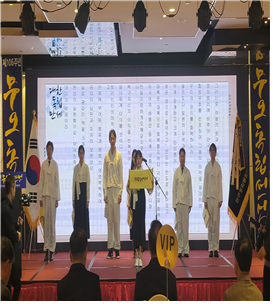
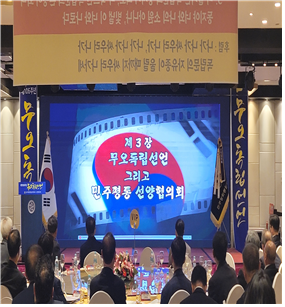
<Reading the Declaration of Independence> <Watching a commemorative video>
The ceremony included the reading of the Declaration of Independence in the Muo Year, watching a commemorative video of the Declaration of Independence in the Muo Year, and singing of the Independence Army Song.
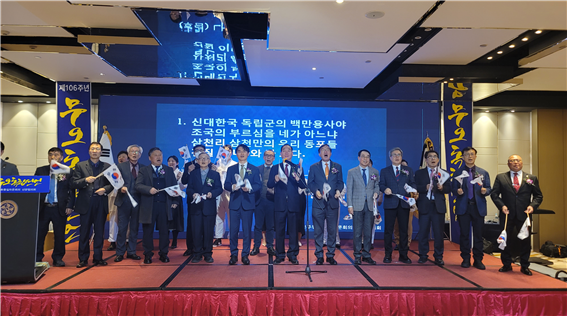
<Singing of the Independence Army Song>
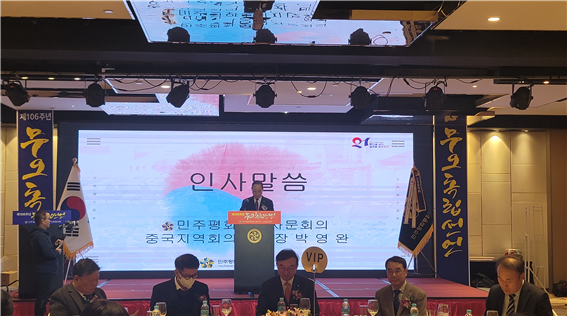
<Park Young-wan, Vice Chairman of the China Assembly and Head of the Shenyang Chapter>
In his opening address, China Assembly Vice Chairman Park Young-wan said: "The year 2025 is meaningful as it marks the 80th anniversary of national liberation, and today marks the 106th anniversary of the proclamation of the Declaration of Independence in the Muo Year, the first declaration of independence in Korea, which took place here on the land of Manchuria. I hope you will understand well the meaning of event.”
“Although the country was liberated from the Japanese invaders in 1945, Korean people spent the past 80 years divided into the South and the North and did not achieve complete independence. Until the day of unification, which is the complete liberation, we must shout 'I am an independent army soldier!' together and unite our will and capabilities to achieve peaceful unification."
Finally, Park said, "Despite the changing international situation and difficult internal and external conditions, PUAC council members in China will take the lead in the promotion of public diplomacy for friendship between South Korea and China ahead of the 2025 APEC Summit."
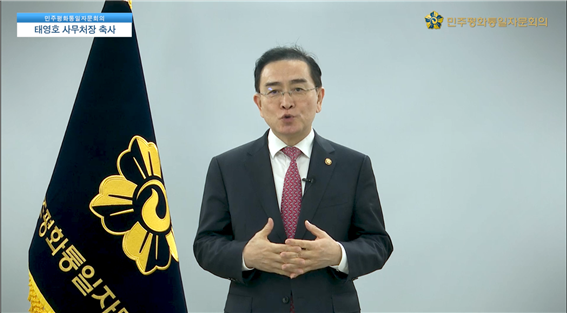
<Secretary General Tae Yong-ho’s video congratulatory remarks>
In his video congratulatory speech, Secretary-General Tae Yong-ho said, "The Declaration of Independence in the Muo Year, which rang out in China on February 1, 1919, went beyond a simple declaration, and sparked the flame for the independence of our people. The Declaration of Independence in the Muo Year was not merely a cry but the beginning of an independence movement based on the will of the people. It was a proud historical milestone that laid out a vision for the future of Korean people. Now we have the responsibility and duty to honor the noble will of our ancestors and inherit the spirit.” “Inheriting the spirit of the Declaration of Independence in the Muo Year, we must overcome the division of the Korean Peninsula and achieve unification," Tae said. "On the occasion of the 106th anniversary of the Liberation of Korea in the year that marks the 80th anniversary of national liberation, I hope that everyone will once again reflect on the meaning of the Declaration of Independence in the Muo Year and get united to move toward unification," he said.
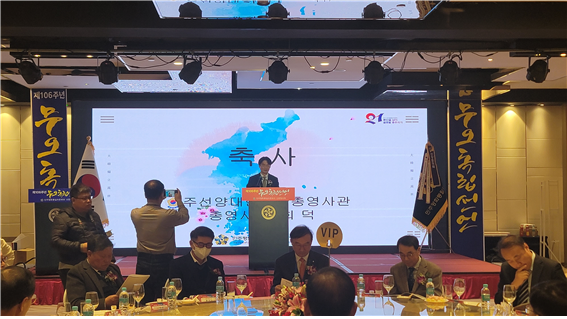
<Shenyang Consul General Choi Hee-deok>
Consul General Choi Hee-deok said in a congratulatory speech, "We are facing tensions on the Korean Peninsula and many internal and external challenges amid the big changes of the international order. But we firmly believe that we the descendants of the independence patriots will be able to move forward without losing our direction even in the face of crisis if we pull together our capabilities and gather wisdom by emulating the spirit of overcoming the national crisis just as we realized independence after overcoming numerous adversities owing to the blood and sweat that the ancestors shed for the national independence in region more than 100 years ago."
Choi also said, "I believe that communication between the two countries will take place actively in various fields ahead of the APEC Leaders Meeting in Gyeongju in November year. I call on you to become a partner and actively participate in the historic task of preparing for the future unification of the Korean Peninsula and the continuous development of South Korea-China relations."
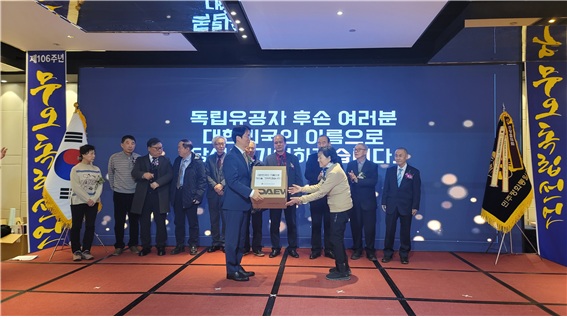
<Gift presentation ceremony for the descendants of independence patriots>
Afterward, a gift presentation ceremony for the descendants of independence patriots was held.
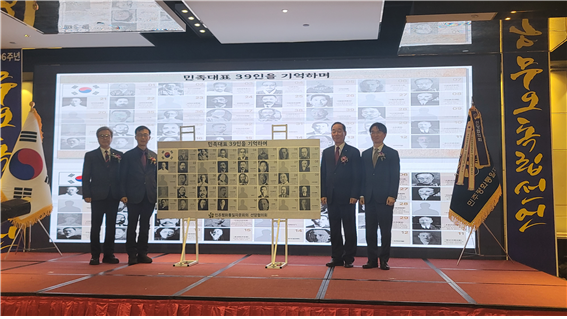
<A ceremony commemorating the signing of the 39 representatives of the Declaration of Independence in the Muo Year>
The day’s event concluded with a ceremony commemorating the signing of the 39 national representatives of the Declaration of Independence in the Muo Year.
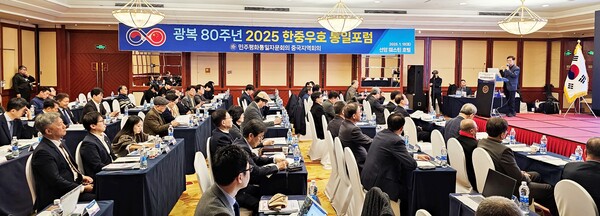
<The 2025 South Korea-China Friendship Unification Forum was held>
The next day, on January 18, the "2025 South Korea-China Friendship Unification Forum" was held with invited experts from both South Korea and China attending prior to the Gyeongju APEC meeting in November year. The forum was held under the auspices of the China Assembly. The forum was more meaningful in that it was held in Shenyang, which is located in the three northeastern provinces, which connect the Korean Peninsula and the mainland China and where one can feel the interconnectedness of the development of South Korea-China relations.
Shin Bong-seop, a visiting professor at Kwangwoon University, presided over the forum which had the theme of "The Future of the Korean Peninsula and South Korea-China Relations. The forum proceeded in the order of △ opening ceremony, △ topic presentation, △ comprehensive discussion, and △ Q&A.
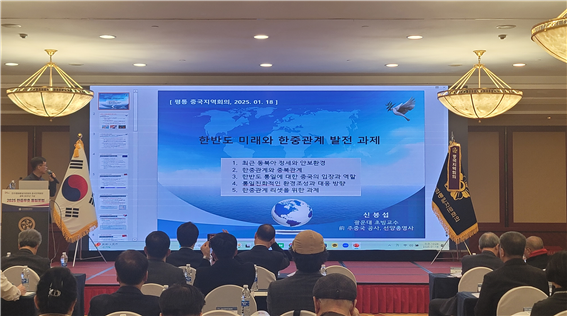
<Shin Bong-seop, visiting professor of Kwangwoon University>
Shin Bong-seop, a visiting professor at Kwangwoon University who presented the topic, spoke about △ the recent situation in Northeast Asia and the security environment △ South Korea-China relations and North Korea-China relations △ China's position and role in the unification of the Korean Peninsula △ the creation of a unification-friendly environment and direction of response △ the task of resetting the South Korea-China relations.
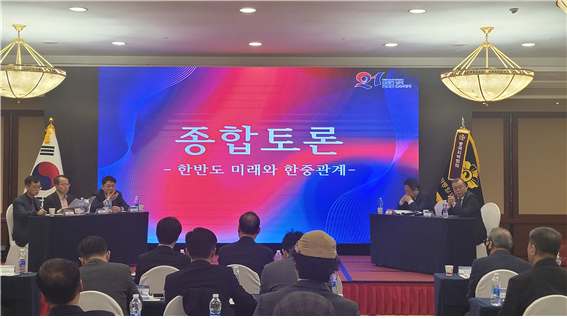
In the following comprehensive discussion, Professor Park Dong-hoon of Yanbian University, Professor Ham Myung-sik of Jilin University, Professor Jang Dong-myung of Liaoning University, and Kim Kyung-soo, former secretary of the China-South Korea Exchange Center of the Northeast Asia Development Institute, attended as the panelists.
Professor Jang Dong-myung of Liaoning University said, "It has been more than 30 years since South Korea and China established diplomatic relations in 1992 and engaged in economic and trade cooperation." "In bilateral relations, the sameness and the sky-blue color are very important. Let's find a lot of common ground and lead the community together on the strength of reconciliation."
Kim Kyung-soo, former secretary of the China-South Korea Exchange Center at the Northeast Asian Development Institute, said, "The future development of South Korea and China is important not only in terms of socio-economic aspects but also in cultural prosperity and convergence." "Regarding the unification of the Korean Peninsula, the two Koreas will be able to further converge and achieve unification ultimately along with the convergence of the Northeast Asia vision, the common peace and the economic growth belt in Northeast Asia," he said.
Professor Park Dong-hoon of Yanbian University said, "In order to prevent the new cold war in Northeast Asia, South Korea has a greater diplomatic maneuvering room for policy flexibility than China, which has become a target of strategic check of the U.S." "South Korea and China can develop sound bilateral relations when they strengthen communication and exchanges with each other to expand their mutual understanding," Park said.
Professor Ham Myung-sik of Jilin University said, “President Trump's return and the accelerating competition for hegemony are increasing the risks on the Korean Peninsula.” "We need to conduct diplomacy based on strategic and balanced thinking to establish a long-term diplomatic vision amid internal and external political risks," Ham said. Experts from both South Korea and China participated and made in-depth discussions in the forum, which concluded with a question-and-answer session.
-
How satisfied are you with the information you have reviewed?







